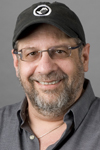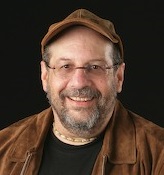November 6th - Mark Hunter Hat Day

Mark HunterIn Memorial

About Hat Day
About Hat Day
Wear a hat on November 6th in honor of the life and work of Mark Hunter
There are times, sitting in a darkened theatre, when my powers of perception, my very senses are heightened, and I feel myself expanding with a sense of possibility, a sudden alertness to that which is, to that which will-or might-be. I see. I hear. And my seeing and hearing are linked to my breathing-and to my awareness of the breath that charges me. Inhale. Oxygen bubbles ride my bloodstream to a synaptic fireworks display. Colors are more vivid, vibrating. Emotions seem full and fleshy. Vision is a paradoxical portal- broadening the field before me while refining the focus at the center of the darkness. My skin is alive, bristling, prepared. My fingers flex. I hear the insistent murmur of coded communications, full of nuance and the pleasures of subtlety. I hear the underscoring of ambient sound. Exhale. Astonishment fills the cavities left vacant by air expelled. Associations flash; connections link; juxtapositions jostle for attention and compete for primacy. I am immersed in complex layers of conjured collages, some burning brightly on the plate of memory, others effervescent, that will resist recall or replication. Neural pathways are bright with activity, and I glide on tiny ripples of rapture. I am on the edge of my seat. I watch and listen and breathe some more. For me, this is the experience of theatrical wonder. And while some of its physical manifestations may be peculiar to me, I believe it is an experience whose fundamental characteristics I share, at least on occasion, with other spectators.
I define theatrical wonder as the experience by a theatrical spectator, during a performance, of a sense of awe and aesthetic appreciation that is coupled with deep feeling and a sense of expanded possibility. It is a phenomenon that, for me at least, happens rarely, but is always accompanied by an acknowledgement that in the experience of it, I have engaged something profound and powerful beyond the confines of its temporal boundary.
(From 'Theatrical Wonder' by Mark Hunter, 2005)
Read more
Honoring Mark Hunter
Art Can't Hurt You
Current and former students gathered on Nov. 14 to remember the life and work of Mark Hunter, associate professor of theatre at Cornell College.
Hunter died Nov. 6. During his career he directed hundreds of performances, and in his 10 years at Cornell was involved in many productions, as well as serving as a mentor to students. You can read the memories students, friends and colleagues have left online, as well as add your own, here.